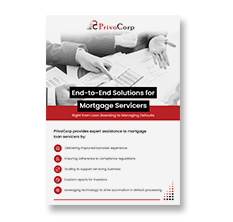The housing market has seen a concerning rise in foreclosure activity over the past year, putting many homeowners at risk of losing their properties. This uptick can be attributed to several economic factors that have made it difficult for borrowers to keep up with their mortgage payments. As lenders grapple with the surge in delinquencies and default mortgage servicing, they must assist struggling borrowers while upholding financial responsibility. The solution lies in implementing targeted programs, embracing alternatives to foreclosure, and utilizing third-party services for compliance support and loan servicing for mortgage companies.
Introduction
After over a decade of declining foreclosure activity following the 2008 financial crisis, the tide has started to turn. According to data from ATTOM Data Solutions, a leading property database, there were over 167,000 foreclosure filings in the first quarter of 2022 – a 39% increase from the previous year and a high not seen since 2013. This uptick encompasses default notices, scheduled auctions, and bank repossessions, signalling growing distress in the housing market. Areas like Chicago, New York, Houston, Miami, and Los Angeles have been hit the hardest.
Several key factors have contributed to the concerning rise in homeowners falling behind on mortgage payments and losing their homes through foreclosure filings and auctions. Understanding these drivers is paramount so lenders can take proactive measures to assist borrowers in staying current on their loans.
Factors Contributing to the Rise in Foreclosures
1. Economic Fluctuations
The COVID-19 pandemic created major shocks for the economy over the past two years, with impacts that continue to ripple through the housing sector. High unemployment during lockdowns left many borrowers unable to pay their mortgages, forcing lenders to offer expanded forbearance programs. Now labour market volatility and rising interest rates are putting further pressure on homeowners’ ability to afford monthly payments.
2. Changing Mortgage Rates
As the Federal Reserve raises interest rates to curb inflation, mortgage rates are climbing in step. The average 30-year fixed rate mortgage topped 7% in late 2022 – more than double what it was during the pandemic-driven refinancing boom. This significantly increases costs for new homebuyers and consumers looking to refinance existing home loans. Higher monthly payments make it tougher to stay current on their mortgages.
3. Unforeseen Events
From flooding and hurricanes to illnesses and job losses, unforeseen events can devastate homeowners financially. If an emergency expense suddenly arises, borrowers can fall behind on their mortgages and face foreclosure. Lenders often lack visibility into these issues, emphasizing the need for clear borrower communication.
4. Economic Uncertainty
High inflation, recession concerns, geopolitical tensions, and market volatility have created an uncertain economic environment. This makes both lenders and borrowers wary about the future. For homeowners, high consumer prices and shrinking budgets raise worries about mortgage affordability down the line.
5. Inflation
As mentioned, rapid inflation has pushed the cost of essentials like food, gas, and utilities dramatically higher over the past year. Combined with rising mortgage payments, these factors squeeze borrowers’ finances, making it harder to stay current on home loans. The foreclosure risk increases if incomes fail to keep up with climbing living expenses.
6. Job Market Instability
While the overall job market remains strong, some sectors face weakness. Hiring freezes and layoffs at technology and finance companies signal a shift. If job losses spread to other industries, mortgage delinquencies and foreclosures could climb further as unemployed homeowners struggle to pay their home loans.
In summary, economic fluctuations, unforeseen events, and housing market changes have created a perfect storm over the past two years. This has pushed an increasing number of borrowers toward financial hardship and mortgage distress. However, lenders are not powerless in the face of this foreclosure surge. They can pursue prudent strategies to aid homeowners while protecting their own interests.
Find out how PrivoCorp can help in improving borrower experience and retaining them

Strategies for Lenders to Assist Borrowers and Ensure Financial Responsibility
Lenders play a crucial role in addressing rising foreclosure activity and loss mitigation. Their methods can make the difference between a borrower losing their home or getting back on solid financial footing. Key initiatives include:
a. Implement Targeted Financial Assistance Programs to Aid Struggling Homeowners
Lenders can develop programs to offer temporary financial assistance to borrowers facing hardship. Examples include low or no-interest loans to cover an emergency expense, grants for one-time mortgage payments, or partial claim advances allowing borrowers to cure a delinquency over time. Well-designed assistance helps borrowers get through temporary difficulty while remaining in their homes.
b. Introduce Loan Modifications Initiatives to Provide Alternatives to Foreclosure
Renegotiating or restructuring loans through modifications is preferable to foreclosure. Options include extending the repayment term, reducing interest rates, or converting adjustable-rate mortgages (ARMs) to fixed-rate mortgages (FRMs) to create predictable payments. Modifications provide an alternative arrangements so struggling borrowers avoid foreclosure.
c. Consider Loan Restructuring and Modification
Restructuring or refinancing loans into more affordable packages also helps homeowners avoid foreclosure. Lenders could reduce principal balances, adjust loan terms, or refinance into lower rate mortgages. This reduces borrowers’ monthly payments to more manageable levels. Partnering with government programs can assist with refinancing as well.
d. Third-Party Vendors Aid Foreclosure Management
Mortgage lenders often turn to experienced third-party vendors for assistance managing increased foreclosure activity. Specialized companies provide customized loss mitigation services, foreclosure counselling, transaction support, and compliance guidance – easing the burden on lenders.
-
Loss Mitigation Services
Vendors thoroughly assess borrowers’ financials to identify the most appropriate solutions. They can administer modification and refinance programs, repayment plans, deficiency waivers, and more to prevent foreclosure.
- Foreclosure Counselling
Counselors educate struggling homeowners on their options, guide them through the process, and help negotiate loan workouts with lenders. This facilitates cooperation between parties.
- Title and Legal Services
Foreclosure involves extensive legal filings and documentation. Third-party legal teams manage court interfaces, filings, affidavits, and title transfers on lenders’ behalf.
- Loan Servicing
Specialized mortgage servicing companies can take over account management and borrower communication activities. This provides expertise and bandwidth lenders may lack.
- Compliance and Regulatory Support
Keeping up with various state and federal laws governing default servicing is complex. Third-party compliance specialists ensure lenders follow legal protocols.
- Short Sales & Deed in Lieu of Foreclosure
When modifications fail, and foreclosure is imminent, third-party agents can manage short sales or deed transfers to facilitate smooth exits. This avoids lengthy foreclosure proceedings.
Overall, mortgage lenders have many avenues to help homeowners avoid foreclosure, from financial assistance to loan servicing for mortgage companies. Targeted programs, prudent modifications, and third-party partnerships are key to overcoming today’s foreclosure challenges.
How PrivoCorp Can Help
As a trusted third-party partner for over 15 years, PrivoCorp assists lenders in tackling every aspect of increased default and foreclosure activity. Our customized loss mitigation services include:
– Specialized software to enhance workflow automation, streamline modification process, and improve compliance
– Trained loss mitigation negotiators to secure viable home retention solutions
– Compliance auditing, monitoring, and support guided by legal expertise
– Administering mortgage assistance programs like nutritional unemployment
– Managing relationships with investors, guarantors, and insurers
– Counselling and education to guide borrowers through options
– Title and closing services for executing loan workouts
– Supporting foreclosure actions, evictions, REO property management
– Reporting and analytics surrounding portfolios and programs
– Advisory solutions drawing on extensive mortgage industry experience
With PrivoCorp’s assistance, lenders can tackle escalating defaults, minimize losses, satisfy stakeholders, and fulfil their financial responsibility even in volatile times. Our collaboration helps more borrowers avoid foreclosure through sustainable loan resolutions. Contact us today to learn more.
Conclusion
In conclusion, the recent surge in foreclosure activity requires proactive efforts from lenders to assist distressed borrowers and uphold loan performance. Providing targeted financial relief, embracing alternatives like loan modifications, and utilizing specialized third-party services for compliance support and loan servicing for mortgage companies is key. With prudent strategies and partnerships, lenders can overcome market challenges while helping homeowners avoid the pain of foreclosure. Although economic uncertainty persists, collaborative solutions that benefit both parties remain possible through open communication and win-win negotiation.








